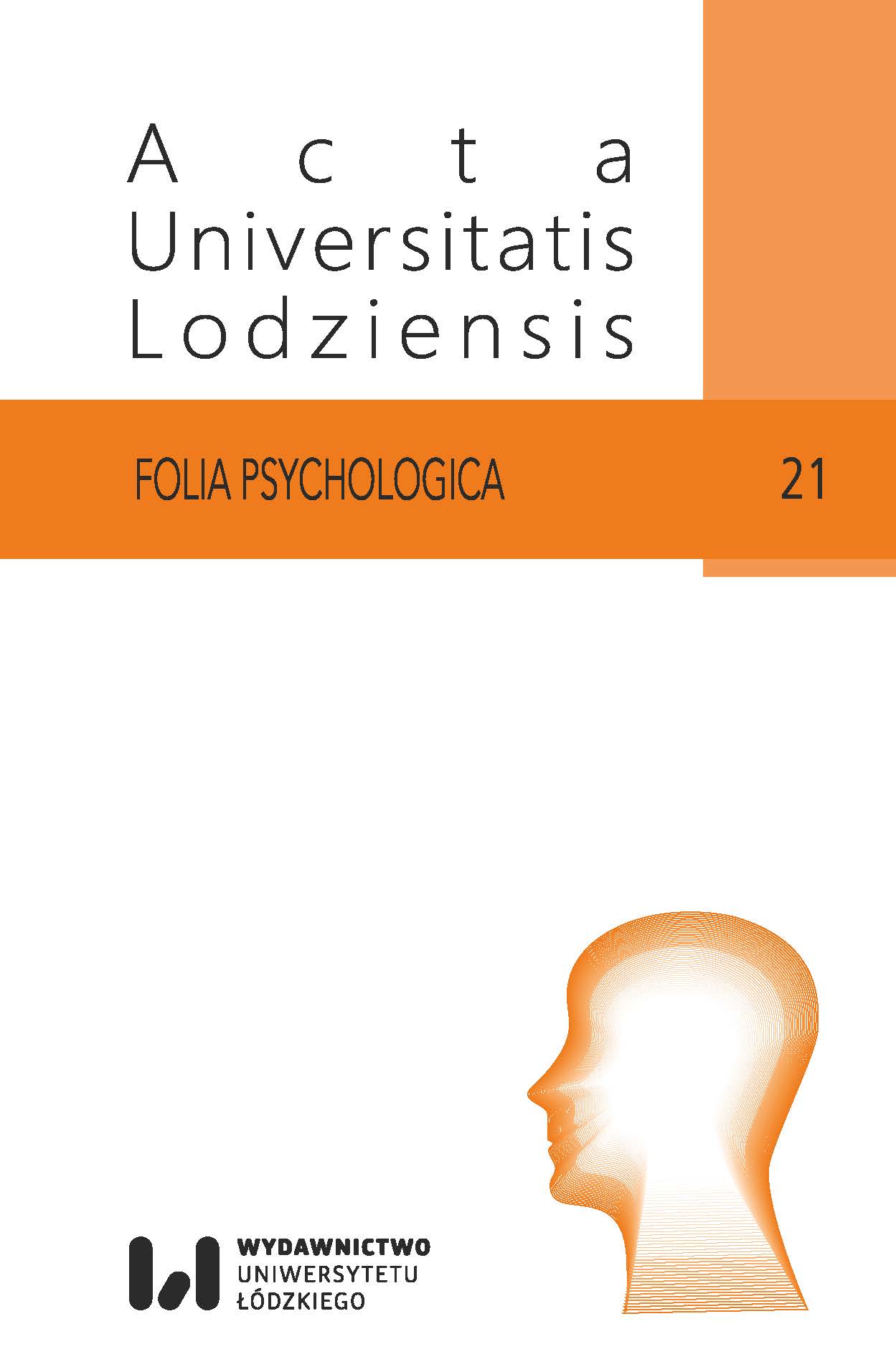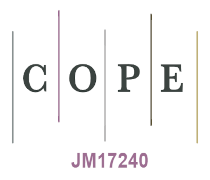Ruminacje a potraumatyczny wzrost u ratowników medycznych
DOI:
https://doi.org/10.18778/1427-969X.21.01Słowa kluczowe:
zdarzenia traumatyczne, potraumatyczny wzrost, ruminacje, ratownicy medyczniAbstrakt
Przedstawiciele służb ratowniczych narażeni są na doświadczanie zdarzeń o charakterze traumatycznym w związku z wykonywaną pracą. Celem badań było ustalenie roli ruminacji w występowaniu pozytywnych zmian potraumatycznych. Badaniami objęto 120 ratowników medycznych, spośród których 85 (55 mężczyzn i 30 kobiet) potwierdziło wystąpienie w ostatnich 5 latach przynajmniej jednego zdarzenia traumatycznego w związku z wykonywaną pracą. Wiek badanych mieścił się w granicach 25–61 lat (M = 38,07, SD = 9,61). W badaniach wykorzystano polskie wersje standaryzowanych narzędzi, tj. Inwentarz Potraumatycznego Rozwoju oraz Inwentarz Ruminacji o Negatywnym Zdarzeniu. Badani ratownicy medyczni ujawnili niski poziom potraumatycznego wzrostu oraz niskie nasilenie ruminacji, tak natrętnych, jak i refleksyjnych. Spośród dwóch analizowanych rodzajów ruminacji jedynie refleksyjne okazały się predyktorami potraumatycznego wzrostu i wszystkich jego czynników. Ruminacje refleksyjne pełnią istotną – choć słabą – rolę w występowaniu pozytywnych następstw doświadczonej traumy.
Bibliografia
Andersen H. S., Christensen A. K., Peterson G. O. (2007). Posttraumatic stress reaction amongst rescue workers after a major rail accident. Anxiety Research, 4 (3), 245–251
Google Scholar
APA (1994). Diagnostic and statistical manual of mental disorders – Fourth edition – DSM-IV. Washington, DC
Google Scholar
APA (2013). Diagnostic and statistical manual of mental disorders. Fifth edition – DSM-5, http://dx.doi.org/10.1176/appi.books.9780890425596
Google Scholar
Calhoun L. G., Tedeschi R. G. (1998). Posttraumatic growth: Future directions. W: R. G. Tedeschi, C. L. Park, L. G. Calhoun (eds.), Posttraumatic growth: Positive changes in the aftermathof crisis (s. 215–238). New Jersey: Lawrence Erlbaum Associates
Google Scholar
Calhoun L. G., Tedeschi R. G. (2006). The foundations of posttraumatic growth: An expanded framework. W: L. G. Calhoun, R. G. Tedeschi (eds.), Handbook of posttraumatic growth (s. 1–23). New Jersey: Lawrence Erlbaum Associates
Google Scholar
Calhoun L. G., Cann A., Tedeschi R. G. (2010). The posttraumatic growth model: Sociocultural considerations. W: T. Weiss, R. Berger (eds.), Posttraumatic growth and culturally competentpractice: Lessons learned from around the globe (s. 1–14). New Jersey: John Wiley & Sons
Google Scholar
Cann A., Calhoun L. G., Tedeschi R. G., Triplett K. N., Vishnevsky T., Lindstrom C. M. (2011). Assessing posttraumatic cognitive processes: The Event Related Rumination Inventory. Anxiety, Stress and Coping, 24 (2), 137–156
Google Scholar
Clohessy S., Ehlers A. (1990). PTSD symptoms, response to intrusive memories and coping in ambulance service workers. British Journal of Clinical Psychology, 38, 251–265
Google Scholar
Dudek B. (2003). Zaburzenie po stresie traumatycznym. Gdańsk: Gdańskie Wydawnictwo Psychologiczne
Google Scholar
Ehlers A., Clark D. M. (2000). A cognitive model of posttraumatic stress disorder. Behaviour Research and Therapy, 38 (4), 319–345
Google Scholar
Ehring T., Ehlers A. (2014). Does rumination mediate the relationship between emotion regulation ability and posttraumatic stress disorder? Psychotraumatology, 26 (5), doi.org/10.3402/ejpt.v.523547
Google Scholar
Foa E. B., Chrestman K. R., Gilboa-Schechtman E. (2014). Przedłużona ekspozycja w terapii PTSD nastolatków. Emocjonalne przetwarzanie traumatycznych doświadczeń. Gdańsk: GdańskieWydawnictwo Psychologiczne
Google Scholar
Gray L. (2008). Emergency service providers’ organizational climate and its role in the development of traumatic stress and posttraumatic growth. Doctoral dissertation, pozyskano z ProQuestDissertations and Theses Database (AAT 47114), http://www.proquest.com/products-services/pqdtglobal.html
Google Scholar
Jonsson A., Segesten K., Mattsson B. (2003). Post-traumatic stress among Swedish ambulance personnel. Emergency Medical Journal, 20 (1), 79–84
Google Scholar
Kirby R., Shakespeare-Finch J., Palk G. (2011). Adaptive and maladaptive coping strategies predict posttrauma outcomes in ambulance personnel. Traumatology, 17 (4), 25–34
Google Scholar
Koniarek J. (1997). Występowanie zaburzeń po stresie urazowym wśród pracowników Pogotowia Ratunkowego w Łodzi (raport z badań). Łódź: Wydawnictwo Instytutu Medycyny Pracy im.prof. J. Nofera
Google Scholar
Lis-Turlejska M. (2009). Zdarzenia traumatyczne – sposoby definiowania, pomiar i rozpowszechnienie. W: J. Strelau, B. Zawadzki, M. Kaczmarek (red.), Konsekwencje psychiczne traumy.Uwarunkowania i terapia (s. 15–33). Warszawa: Wydawnictwo Naukowe SCHOLAR
Google Scholar
Melersky J. (2008). Trauma, coping, and functioning in a sample of rescue workers 34 to 39 months after September 11th. Doctoral dissertations, pozyskano z ProQuest Dissertations and ThesesDatabase (AAT 3283333), http://www.proquest.com/products-services/pqdtglobal.html
Google Scholar
Nolen-Hoeksema S. (2000). The role of rumination in depressive disorders and mixed depressive / anxiety symptoms. Journal of Abnormal Psychology, 109 (3), 504–511
Google Scholar
Ogińska-Bulik N. (2015). Dwa oblicza traumy – negatywne i pozytywne skutki zdarzeń traumatycznych u pracowników służb ratowniczych. Warszawa: Wydawnictwo Difin
Google Scholar
Ogińska-Bulik N. (2016a). Negatywne i pozytywne następstwa doświadczonej traumy – rola ruminacji. Psychiatria i Psychologia Kliniczna, 16 (3), 182–187
Google Scholar
Ogińska-Bulik N. (2016b). Rola ruminacji w występowaniu pozytywnych zmian potraumatycznych u osób zmagających się z chorobami nowotworowymi. Psychoonkologia, 20 (1), 1–8. doi: 10.5114/pson.2015.55305
Google Scholar
Ogińska-Bulik N. (2016c). Ruminacje a skutki traumy u kobiet doświadczających przemocy w rodzinie/Ruminations and effects of trauma in women experiencing domestic violence. Roczniki Psychologiczne, 19 (4), 627–658
Google Scholar
Ogińska-Bulik N. (2016d). Ruminacje a negatywne i pozytywne skutki traumy u zakażonych HIV. Psychiatria, 13 (1), 8–16
Google Scholar
Ogińska-Bulik N., Ciechomska M. (2016). Posttraumatic growth of parents struggling with cancer disease of their child – the role of rumination/Wzrost po traumie u rodziców zmagających się z chorobą nowotworową dziecka – rola ruminacji. Postępy Psychiatrii i Neurologii, 25 (2), 99–110, http://dx.doi.org/10.1016/j.pin.2016.05.002
Google Scholar
Ogińska-Bulik N., Juczyński Z. (2010). Rozwój potraumatyczny – charakterystyka i pomiar. Psychiatria, 7 (4), 129–142
Google Scholar
Ogińska N., Juczyński Z. (2015). Inwentarz Ruminacji o Negatywnym Zdarzeniu – polska adaptacja the Event Related Rumination Inventory. Przegląd Psychologiczny, 58 (3), 383–400
Google Scholar
Ogińska-Bulik N., Juczyński Z. (2016). Ruminacje a negatywne i pozytywne następstwa doświadczonych zdarzeń traumatycznych u ratowników medycznych. Medycyna Pracy, 67 (2), 201–211
Google Scholar
Regehr C., Goldberg G., Hughes J. (2002). Exposure to human tragedy, empathy and trauma in ambulance paramedics. American Journal of Orthopsychiatry, 72 (4), 505–513
Google Scholar
Salsman J. M., Segerstrom S. C., Brechting E. H., Carlson C. R., Andrykowski M. A. (2009). Posttraumatic growth and posttraumatic stress disorder symptomatology among colocteral cancer survivors: A 3 month longitudinal examination of cognitive processing. Psychooncology, 18, 30–41
Google Scholar
Steuden S., Janowski K. (2016). Trauma – kontrowersje wokół pojęcia, diagnoza, następstwa, implikacje praktyczne. Roczniki Psychologiczne, XIX (3), 549–565
Google Scholar
Su Y. J., Chen S. H. (2015). Emerging posttraumatic growth: A prospective study with pre- and posttrauma psychological predictors. Psychological Trauma: Theory, Research, Practice, andPolicy, 7 (2), 103–111, http://dx.doi.org/10.1037/tra0000008
Google Scholar
Tedeschi R. G., Calhoun, L. G. (1996). The Post-Traumatic Growth Inventory: Measuring the positive legacy of trauma. Journal of Traumatic Stress, 9 (3), 455–471
Google Scholar
Tedeschi R. G., Calhoun L. G. (2004). Posttraumatic growth: Conceptual foundations and empirical evidence. Psychological Inquiry, 15, 1–8
Google Scholar
Taku K., Calhoun L. G., Cann A., Tedeschi R. G. (2008). The role of rumination in the coexistence of distress and posttraumatic growth among bereaved Japanese university students. Death Studies, 32, 428–444
Google Scholar
Watkins E. (2004). Adaptive and maladaptive ruminative self-focus during emotional processing. Behaviour Research and Therapy, 42 (9), 1037–1052
Google Scholar









